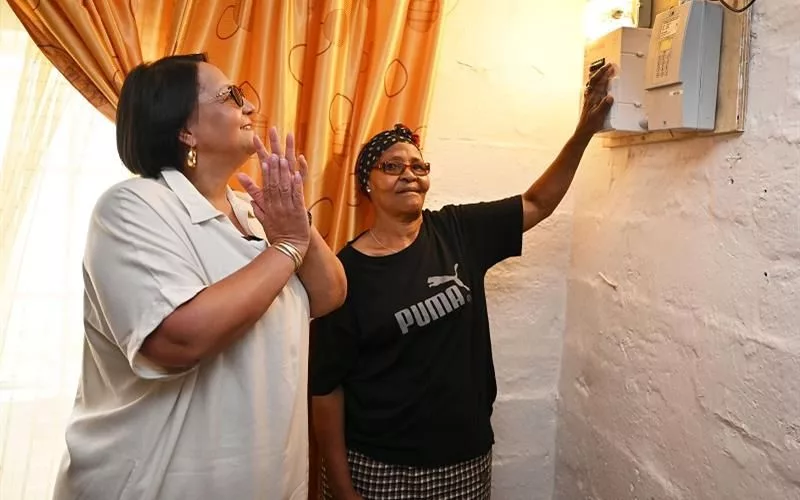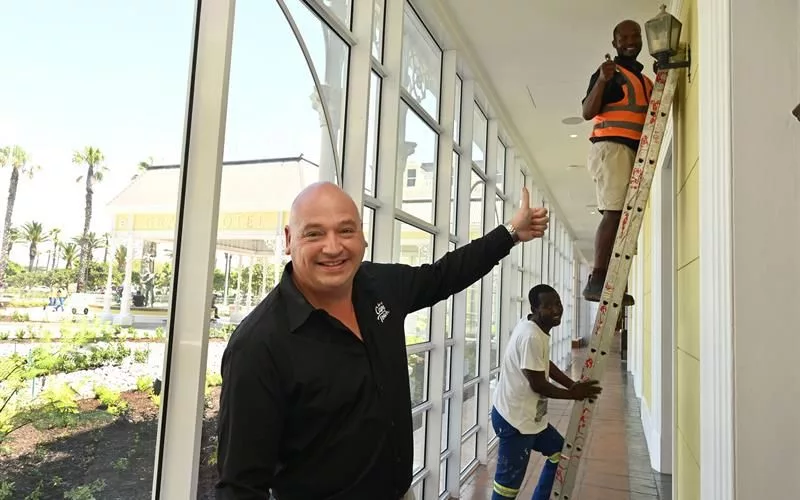The city’s commitment to improving the safety and quality of life for residents is bringing a positive change to the Jabula Settlement in Philippi as households are connected to the electricity grid. The electrification efforts aim to provide basic electricity services and instill a sense of security. The city has allocated a budget of R23 million towards electrifying an estimated 2,440 households in the financial year of 2022/23, overseen by the Mayoral Committee Member for Energy, Councillor Beverley van Reenen. The move is transforming the lives of residents and promoting progress and inclusivity.
Philippi’s Jabula Settlement is undergoing a transformative change as the municipal government connects households to the electricity grid. This move improves residents’ safety and quality of life, instilling a sense of security and providing basic electricity services. The city’s commitment is evident in its electrification efforts, allocating a budget of R23 million towards electrifying an estimated 2,440 households in the financial year of 2022/23. The initiative is overseen by the city’s Mayoral Committee Member for Energy, Councillor Beverley van Reenen.
Section 1: A Festive Season Transformation
Amid the festive season’s annual cheer and vibrancy, a transformative change is sweeping Jabula, an informal settlement in Philippi. The municipal government has embarked on a laudable project to connect these households to the electricity grid, signaling a meaningful step towards improving the safety and quality of life for residents.
Jabula, nestled on privately-owned property, has been home to 63 households living without electricity. This narrative, however, is swiftly changing, and the metamorphosis is evident. The private landowner has kindly permitted the city to start the electrification of the settlement, offering the opportunity for these residents to enjoy a brighter festive season and a significantly improved quality of life in the future.
Section 2: Connectivity and its Repercussions
The process of electrification redefines the residents of Jabula’s place in the city. No longer just an isolated pocket of the city, they are now woven into the city’s vibrant tapestry, benefiting from the basic electricity services that many often overlook. This newfound connection carries dual significance. Primarily, it instills a sense of security among residents. Additionally, it sets the stage for a festival season lit up with electricity, promising to be an unforgettable experience for the residents.
Section 3: The City’s Commitment and Progress
The city’s active measures strongly demonstrate its dedication to its inhabitants. This dedication is evident in its remarkable record of electrifying nearly all older informal settlements in the metropolitan area situated on city-owned land or in city-serviced zones, where feasible. This colossal effort involves connecting a broad array of housing types to the electricity grid, from formal subsidized housing to informal settlements, infills, and backyard connections.
In the financial year of 2022/23, the city allocated a significant budget of R23 million towards electrifying an estimated 2,440 households. The person overseeing this impressive initiative is the city’s Mayoral Committee Member for Energy, Councillor Beverley van Reenen.
Section 4: Vigilance and Safety Measures
With such accelerated development, maintaining vigilance is crucial. The city has implemented strategies to encourage residents to report any damage to the municipal electrical infrastructure through various means such as SMS or email. Additionally, the city promotes anonymous information from residents who notice any unlawful activities, such as vandalism or unauthorized electricity connections. An emergency hotline further strengthens the city’s safety measures, enhancing the protective layer around its residents.
Section 5: A Narrative of Progress and Inclusivity
Ultimately, Jabula’s electrification is about more than merely providing electricity. It serves as a symbol of the city’s unwavering efforts to uplift its residents’ lives, particularly those residing in informal settlements. Through this venture, they are weaving together the stories of the city and these informal settlements, initiating a conversation around inclusivity and progress.
1. What is the Jabula Settlement in Philippi?
Jabula Settlement is an informal settlement located in Philippi, South Africa. It is home to 63 households living without electricity.
2. What is the city’s commitment towards the Jabula Settlement?
The city is committed to improving the safety and quality of life for residents by connecting households to the electricity grid. The city has allocated a budget of R23 million towards electrifying an estimated 2,440 households in the financial year of 2022/23, overseen by the Mayoral Committee Member for Energy, Councillor Beverley van Reenen.
3. What is the significance of electrification for Jabula residents?
Electrification carries dual significance for Jabula residents. Firstly, it instills a sense of security among residents. Secondly, it sets the stage for a festival season lit up with electricity, promising to be an unforgettable experience for the residents.
4. What is the city doing to maintain vigilance and safety measures?
The city has implemented strategies to encourage residents to report any damage to the municipal electrical infrastructure through various means such as SMS or email. Additionally, the city promotes anonymous information from residents who notice any unlawful activities, such as vandalism or unauthorized electricity connections. An emergency hotline further strengthens the city’s safety measures.
5. What is the city’s record in electrifying informal settlements?
The city has a remarkable record of electrifying nearly all older informal settlements in the metropolitan area situated on city-owned land or in city-serviced zones, where feasible. This colossal effort involves connecting a broad array of housing types to the electricity grid, from formal subsidized housing to informal settlements, infills, and backyard connections.
6. What does the electrification of Jabula Settlement symbolize for the city?
The electrification of Jabula Settlement is a symbol of the city’s unwavering efforts to uplift its residents’ lives, particularly those residing in informal settlements. Through this venture, they are weaving together the stories of the city and these informal settlements, initiating a conversation around inclusivity and progress.








